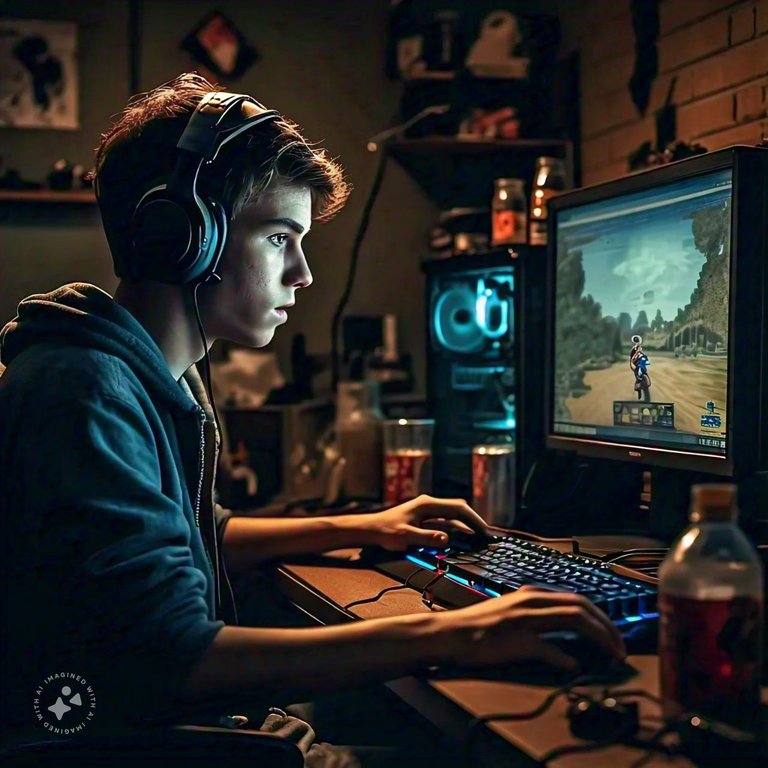
Saludos queridos lectores.
Hace algún tiempo hablamos de este tema, aunque desde otro punto de vista, en ese entonces nos enfocamos en que la persona al otro lado es valiente, es decir, siente el valor de decir y hasta amedrentar ya que no es visto por nadie, nadie conoce su yo real y mucho menos el lugar donde reside.
Aquel tema en el cual también fui partícipe relatando una experiencia propia, sin embargo en esta ocasión este tema irá a un lado más delicado, un tema en el cual los más vulnerables “los niños” pueden verse afectados.
Primero que todo les diré el porqué de este tema y reflexión, siempre hace falta un comienzo para ver qué gatilló la preocupación y encendió la alerta.
Hace ya un par de meses me adentre en el mundo del stream, poco a poco aprendo lo que es ser una streamer (presentadora en vivo), jugar videojuegos, reaccionar a videos, hablar de cosas comunes y hasta hacer recorridos y acompañarme a escribir para #hive. Esta plataforma se llama kick (plataforma de transmisión en vivo) y lleva un par de años, bueno es aquí donde nació esta preocupación y no porque la plataforma sea insegura, sino porque la internet en sí es insegura para quienes son pequeños y crédulos.

Captura de pantalla de mi perfil en Kick.
Anoche viendo un stream “x”, en la pantalla se lograba ver el juego, uno de formato shooter (disparos), en una pantalla menor se lograba ver al usuario, hasta ahí todo normal, hasta que se escuchó la voz de su compañero jugador.
Del otro lado de su línea un niño de doce años de edad con toda naturalidad le preguntó –¿oye cuántos años tienes?– La expresión facial del streamer fue notoria, bajo la mirada, luego observó a un costado y al paso de unos cuantos minutos respondió –tengo veinticuatro años–.

A simple vista se podía ver que esa no era su edad real, se veía de unos treinta y cinco a treinta y nueve años aproximadamente, su reacción corporal también lo delató, se volvió nervioso y sus maniobras en el juego se anularon, al responderle al niño en automático su personaje murió, la desconcentración fue notoria.
Supongo se dio cuenta de que estaba en vivo y que más personas lo estaban observando, el chat de su stream empezó a llenarse de frases como engañador, eres un viejo mentiroso y así unas cuantas más que son irreproducibles; mientras tanto el niño que aún seguía hablando decía sólo cosas de dicho juego, ¿cómo podría él saber lo pasaba?
Estos juegos online tienen la particularidad de que puedes hablar en línea con tu “equipo” (grupo de jugadores), sin embargo no se pueden ver. Y acá el peligro se vuelve mayor cuando el “equipo” forma grupos de WhatsApp y otra aplicación de mensajería, números sin rostro o con imágenes al azar, el peligro se cuantifica, están conectados la mayor parte del día ya sea jugando o chateando.
Niños jugadores quienes piensan que todo está bien, son niños inocentes divirtiéndose en su hogar, supuestamente “seguros”, pero esa seguridad lentamente se desvanece cuando un nuevo “amigo” llega a su grupo de juegos online, niños que no son niños, son adultos disfrazados, a veces acechando o simplemente jugando, pero entonces ¿por qué no decir su edad real? ¿Qué hay que ocultar? Estos son los temores a los que nos vemos envueltos cuando tenemos hijos.

Bajo este punto hay que estar atentos, saber con quién juegan, insistir en que si van a jugar lo hagan con quien si conocen en la vida real, que sean de edades similares y que si alguien llega haciéndose pasar por su amigo y queriendo regalarle “mejoras para el juego o una skin (disfraz virtual o apariencia mejorada) nueva” digan que no, esos simples regalos pueden terminar siendo caros, más de lo que ellos puedan imagina.
La Internet es maravillosa si la usamos de forma adecuada y puede ser una pesadilla si somos descuidados, entreguemos confianza a nuestros niños para que puedan contarnos todo, así de ese modo estaremos listos a protegerlos ante cualquier amenaza que nazca en medio de un divertido juego.
English

Greetings dear readers.
Some time ago we talked about this topic, although from another point of view, at that time we focused on that the person on the other side is brave, that is to say, he feels the courage to say and even intimidate since he is not seen by anyone, no one knows his real self and much less the place where he resides.
That topic in which I was also a participant relating my own experience, however this time this topic will go to a more delicate side, a topic in which the most vulnerable "children" may be affected.
First of all, I will tell you the reason for this topic and reflection, it is always necessary to start to see what triggered the concern and turn on the alert.
A couple of months ago I got into the world of stream, little by little I learn what it is to be a streamer (live presenter), play video games, react to videos, talk about common things and even make tours and accompany me to write for #hive. This platform is called kick (live streaming platform) and has been around for a couple of years, well this is where this concern was born and not because the platform is unsafe, but because the internet itself is unsafe for those who are small and gullible.

Captura de pantalla de mi perfil en Kick.
Last night watching a stream "x", on the screen you could see the game, one of shooter format, on a smaller screen you could see the user, so far so normal, until you heard the voice of his fellow player.
On the other side of the line a twelve year old boy naturally asked him, "Hey, how old are you?" The streamer's facial expression was notorious, he looked down, then looked to the side and after a few minutes he answered, "I am twenty-four years old".

At first glance you could see that this was not his real age, he looked about thirty-five to thirty-nine years old approximately, his body reaction also gave him away, he became nervous and his maneuvers in the game were annulled, when he answered the boy automatically his character died, the lack of concentration was notorious.
I guess he realized he was live and that more people were watching him, the chat on his stream started to fill with phrases like deceiver, you are an old liar and so a few more that are irreproducible; meanwhile the boy who was still talking was only saying things about the game, how could he know what was going on?
These online games have the particularity that you can talk online with your "team" (group of players), however you cannot see each other. And here the danger becomes greater when the "team" forms groups of WhatsApp and other messaging applications, faceless numbers or random images, the danger is quantified, they are connected most of the day either playing or chatting.
Child gamers who think everything is fine, they are innocent children having fun at home, supposedly "safe", but that safety slowly fades away when a new "friend" arrives in their online gaming group, children who are not children, they are adults in disguise, sometimes stalking or just playing, but then why not tell their real age, what is there to hide? These are the fears we are involved with when we have children.

Under this point we must be attentive, know who they play with, insist that if they are going to play they do it with someone they know in real life, that they are of similar ages and that if someone comes pretending to be their friend and wanting to give them "improvements for the game or a new skin (virtual disguise or improved appearance)" say no, those simple gifts can end up being expensive, more than they can imagine.
The Internet is wonderful if we use it properly and it can be a nightmare if we are careless. Let's give our children confidence so they can tell us everything, that way we'll be ready to protect them against any threat that arises in the middle of a fun game.
Las imágenes usadas fueron creadas en Meta IA y la portada fue creada en canva.


Excelente publicación... Desconozco esas plataformas que mencionas, pero sin dudas representan un portal a innumerables experiencias positivas y otras no tanto. Soy d el "vieja escuela", pienso que los niños tienen que tener control estricto del uso de los móviles, horarios, orientación, e incentivarlos a actividades edificantes en su realidad. Recientemente a mi hija de 14 le regalaron un apartico de esos de realidad virtual, me lo coloqué y quedé impactada con lo que vi, es muy fácil perderse en esos mundo virtuales, sobre todo esos niños que están solos en el día o que tienen problemas en casa, es la mejor forma de evadirse. Ojalá más padres concienticen sobre el asunto.
Como padres a veces podemos hacer pensar "esta jugando en casa ¿qué podría suceder?" y desconocemos con quien o quienes juegan nuestros hijos.
Mi sobrino mayor empezó a jugar de sus ocho años, la suerte de él es que mis hermanos (sus tíos) juegaban los mismos juegos así que entraban a sus "grupos" así lo cuidaban. Estos juegos como tienen la particularidad de que pueden comunicarse por vos mientras juegan les resultaba más fácil identificar si eran niños, adolescentes o adultos.
Es un mundo de falsa seguridad al cual debemos estar atentos.